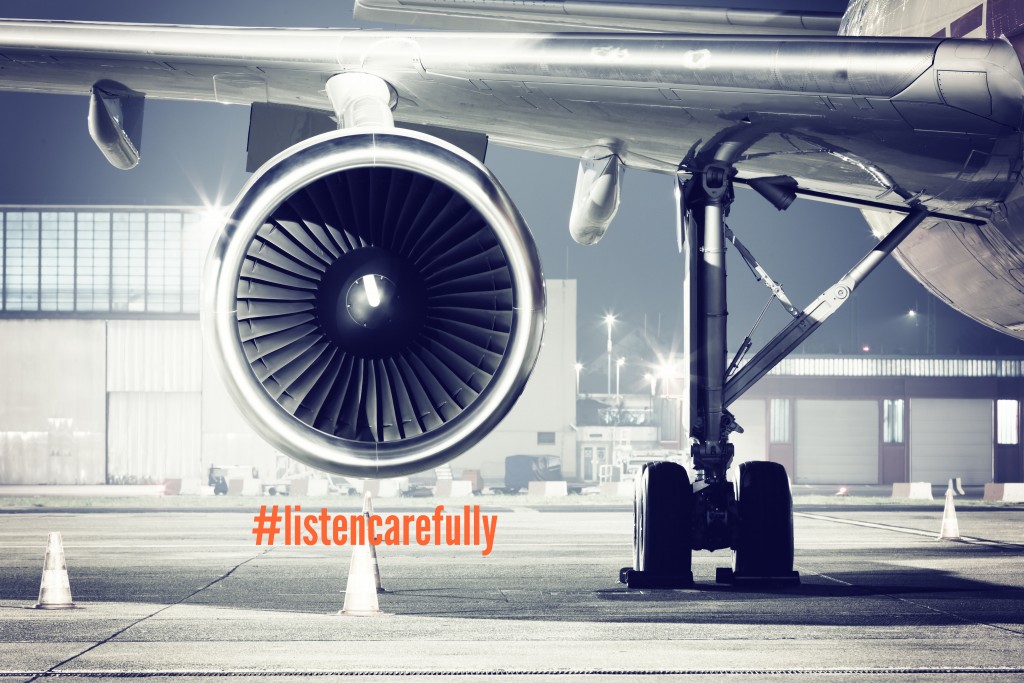During a recent business trip to visit our headquarters in Minneapolis, I was reminded how loud traveling can be.
An infant screamed into her mother’s ear (repeatedly), the airplane engine hummed for three hours, and loudspeaker announcements jolted me from my seat without warning.
So I did some more research to find out just how loud my trip was, and how it could affect my
long-term hearing health.
Why are airplanes so loud?

Let’s start with the
why of airplane noise. We know planes are big, loud machines, but what makes them that way? According to
Pilot Magazine, there are four sources of noise that impact pilots, passengers, and airline personnel.
- The Propeller
An airplanes propeller causes compression and rarefaction of the air, setting air molecules in motion roughly 4,800 times a minute in the case of a two-blade propeller.
- Aerodynamic Noise
This type of noise increases with aircraft speed as well as at low altitudes due to the air’s density. Low-flying, high-speed military aircraft, for example, produce extremely loud aerodynamic noise.
- Engine Exhaust
Most exhaust noise is created by the swift expansion of hot gases into cold air.
Olen Nelson, president of Aero Sound Shield, describes it this way. “The exhaust is released right about below the rudder pedals, and the airflow is going to push each pulse right up against the bottom of the fuselage. It’s regenerating a lot of noise right through the belly skin, just as though a bass drummer were pounding on it and you were sitting inside the drum.”
- Engine Vibration
Jet engines are responsible for most of the aircraft noise you hear during take off and climb.
Boeing also notes landing gear extension and retraction and extension of speed breaks also play a role.
Your Hearing at 30,000 Feet
Noise levels inside an Airbus A321 have been reported as approximately 78dB. During taxi, noise levels are lower, at 65 dB. This is approximately 20 decibels louder than recommended levels for an office building (so maybe reconsider the in-flight business meetings!).
Need another reason to leave the big decisions to boardrooms on the ground? In
one study comparing the effect of aircraft noise to the effect of alcohol on cognitive performance, it was revealed that simulated aircraft noise at 65 dB had the same effect on individuals’ ability to recall auditory information as being intoxicated with a blood alcohol level of 0.10.
But it might surprise you that airplanes themselves (blaring engines and all) aren’t necessarily biggest noise culprit. The grand prize for this distinction goes to…babies! An
infant’s scream can register at 122dB!
4 Tips for a Relaxing Flight
While we can’t guarantee complete quiet, there are certainly measures you can take to protect your hearing while traveling, as well as have as pleasant of a flight as possible.
- Bring earplugs or headphones. This is the obvious one. Passive noise-reduction earplugs and noise-cancelling headphones will keep airplane sounds muffled.
- Pack socks. On longer flights, kick off your shoes and pull on a comfortable pair of socks to keep your feet cozy and comfortable.
- Don’t leave the house without snacks. Whether it’s a freshly made salad, trail mix, or your favorite bag of tea, bringing a little food from home will help curb mid-flight cravings and keep you away from expensive (and disappointing) airline food. If you must order from the airlines menu, the one bit of good news is recent studies have shown that flying affects the way we perceive flavor, making food taste better in the sky.
- Practice mindfulness. Sometimes this is easier said than done, especially when the infant nearby is screaming. With my noise-cancelling headphones, it was easier than ever to smile, close my eyes, and try to stay grounded in the loud cabin.
What about you? Share your favorite flying tips in the comments, and be sure to protect your ears on those fun summer vacations!
 Let’s start with the why of airplane noise. We know planes are big, loud machines, but what makes them that way? According to Pilot Magazine, there are four sources of noise that impact pilots, passengers, and airline personnel.
Let’s start with the why of airplane noise. We know planes are big, loud machines, but what makes them that way? According to Pilot Magazine, there are four sources of noise that impact pilots, passengers, and airline personnel.
